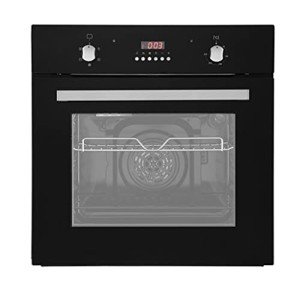You'll Never Guess This Build In Oven's Tricks
본문

The Ultimate Guide to Built-in Ovens: Enhancing Your Kitchen Experience
Built-build In oven ovens have actually ended up being a popular choice in modern-day kitchen areas, providing a mix of functionality, design, build In Oven and convenience. Unlike standard freestanding ovens, built-in ovens are integrated perfectly into cabinets, offering a structured appearance that can enhance the visual appeal of any kitchen. This article explores the different types of built-in ovens, their advantages, installation considerations, and upkeep ideas.
Understanding Built-in Ovens
Built-in ovens are created to be installed straight into kitchen built in oven cabinets, enabling a more tailored kitchen setup. They typically come in 2 main types: single and double ovens.
Kinds Of Built-in Ovens
Single Ovens: These units use one cooking compartment, perfect for smaller sized cooking areas or homes where cooking needs are modest.
Double Ovens: As the name recommends, these units feature two separate cooking compartments, permitting users to cook numerous meals at different temperature levels simultaneously. This is especially beneficial for large families or those who often entertain visitors.
Steam Ovens: These ovens cook food utilizing steam, which can help keep moisture and nutrients. Steam ovens are gaining popularity due to their health advantages.
Mix Ovens: These versatile appliances combine the functions of a regular oven and a microwave, making them perfect for fast cooking and reheating.
Key Features to Look For
When thinking about a built-in oven, there are numerous features that can boost your cooking experience:
Smart Technology: Many contemporary built-in ovens come equipped with wise technology, allowing users to manage their oven from another location via mobile phone apps. Features include pre-heating the oven, changing cooking times, and monitoring cooking progress.
Self-Cleaning Functions: Built-in ovens with self-cleaning abilities can conserve time and effort in kitchen upkeep.
Convection Heating: This feature circulates hot air for even cooking, making it ideal for baking.
Security Features: Look for models equipped with features like cool-to-the-touch oven doors and automatic shut-off options for added security.
Advantages of Built-in Ovens
Visual Appeal: Built-in ovens offer a streamlined and contemporary appearance that can boost the total design of a kitchen. They can be included into cabinets, making them less invasive than freestanding designs.
Area Efficiency: built in range-in ovens optimize kitchen area, especially in smaller sized kitchens where every inch counts. They can be positioned at eye level, making it easier to keep track of cooking without bending down.
Enhanced Functionality: With their innovative functions, built-in ovens use enhanced cooking experiences and increased functionality compared to traditional ovens.
Installation Considerations
Setting up a built-in oven needs mindful preparation and factor to consider. Here are some bottom lines to bear in mind:
Space Requirements: Ensure that the selected oven fits snugly into the available cabinet area. Measure the measurements properly, representing ventilation and clearance requirements.
Electrical Requirements: build in oven Built-in ovens normally need a devoted electrical circuit. Talk to an electrical contractor for appropriate installation.
Ventilation: Proper ventilation is important for ideal oven efficiency. Verify that the setup location has sufficient ventilation to prevent overheating and make sure safe operation.
Professional Installation: While DIY installation may appear tempting, getting the aid of an expert can make sure that the oven is set up properly and securely.
Setup Steps
| Setup Step | Description |
|---|---|
| Action 1: Measure | Step the cabinet opening for your oven. |
| Action 2: Prepare | Prepare the electric outlet and ventilation options. |
| Action 3: Connect | Connect the oven to power, making sure all security measures are complied with. |
| Step 4: Secure | Secure the oven within the kitchen cabinetry, utilizing suitable screws and brackets. |
| Step 5: Test | Run a test to make sure the oven is working correctly. |
Maintenance Tips
Routine maintenance can extend the life of your built-in oven and ensure optimal performance. Here are some maintenance ideas:
Clean Regularly: Wipe down the oven exterior and clean the interior regularly. Use self-cleaning functions where available.
Examine Seals: Ensure that door seals are undamaged to preserve effectiveness and cooking performance.
Monitor Performance: Pay attention to how your oven functions-- if you discover uneven cooking or unusual sounds, it may need expert maintenance.
Follow Manufacturer Guidelines: Always adhere to the upkeep guidelines offered by the producer. This can help avoid issues and make sure that service warranties remain valid.
FAQs about Built-in Ovens
What is the difference in between a built-in oven and a freestanding oven?
- Built-in ovens are integrated into cabinets, offering a structured look, while freestanding ovens are standalone appliances that can be put throughout the kitchen.
Do built in oven to buy-in ovens require more maintenance than regular ovens?
- Not always. Upkeep depends on use and cleansing practices more than the type of oven. Regular care is necessary for all ovens.
Can I set up a built-in oven myself?
- While it is possible to install a built-in oven yourself, it is advised to employ a professional to ensure safe and precise installation, especially concerning electrical requirements.
What are the average expenses of built-in ovens?
- Costs can differ substantially based upon brand, features, and specs. Basic models may begin around ₤ 800, while high-end designs can go beyond ₤ 3,000.
Are built-in ovens energy-efficient?
- Many contemporary built-in ovens are created to be energy-efficient. Search for models with an ENERGY STAR accreditation for the best performance.
In conclusion, built-in ovens are an outstanding addition to any modern-day kitchen, integrating looks with performance. By comprehending the different types of built-in ovens, their features, and the associated installation and maintenance requirements, homeowners can make an informed choice that boosts their cooking experience and general kitchen style. As cooking technology develops, built-in ovens are likely to play an integral role in the future of home kitchens, ensuring tasty meals are prepared with ease and benefit.

